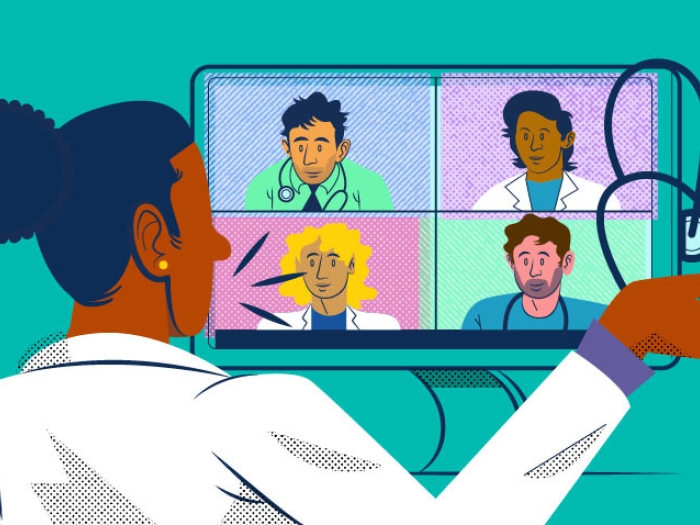Good grades and strong test scores? That’s a given. The human side of a candidate counts, too. Here’s what two U-M admissions officers want to see.
7:00 AM
Author |

Most medical school applicants know that the process can't be rushed.
And admissions officers can often spot gaps, shortcuts or narrowly defined attempts to fit a perceived profile of an ideal candidate.
LISTEN UP: Add the new Michigan Medicine News Break to your Alexa-enabled device, or subscribe to our daily audio updates on iTunes, Google Play and Stitcher.
"Too many prospective medical students say, 'I have to do this, this and this'" on their applications, says Steven Gay, M.D., M.S., assistant dean for admissions at the University of Michigan Medical School.
"They're going through the actions they think they need to be good candidates for medical school, but not exploring what they need to become great physicians."
Strong academics and test scores are a given, of course. Top medical schools receive thousands of applications and extend interview offers to just a fraction of the applicant pool.
But the review is far more than a numbers game.
Doctoring is personal, a job that puts human lives and well-being on the line. So medical schools, including Michigan, are starting to require that applicants take situational judgment tests such as CASPer.
They're also reviewing applications for evidence of an applicant's values, passions and priorities — hallmarks that could offer clues to how that person might fare in academics and real-world practice.
"We're really taking a lot of different points from the application," says Carol Teener, M.A., admissions director for the U-M Medical School. "We want to get a sense of what's important to that person and how they went the extra mile."
She and Gay spoke more about what they're looking for:
Medical school application tips
1. Pursue well-rounded coursework
There's no specific path that gets someone into med school more easily.
"A person should major in what resonates with them," Gay says. "There are subjects we want you to have a strong understanding of and knowledge base for, but how and where you learn them is up to you."
MORE FROM THE LAB: Subscribe to our weekly newsletter
Those benchmarks include statistics, developing a hypothesis and problem-solving — topics that could be applied via nonscience majors such as English or mathematics.
Regardless of your major, choose rigorous activities that fulfill U-M's core competencies. Workplace and post-baccalaureate experience can also help supplement that knowledge.
2. Take advantage of pre-health advisors
Longtime doctors or older mentors might assume that former med school admissions metrics still apply.
That's no longer the case: "People who went through the process years ago are under the assumption that all you need is good test scores and a great GPA," Teener says.
Undergraduates should visit their college's pre-health advising service to gain insight on course selection and sequencing, test preparation workshops and application review — as well as navigating "the rapidly changing landscape of what medical schools want," Gay says.
Those whose schools or alma maters don't have pre-health advisors can access a national database via the National Association of Advisors for the Health Professions.
Let us know who you are, and put yourself in the best light you can. We want to know what is important to you and what you are passionate about.Steven Gay, M.D., M.S.
3. Spotlight your passions
Many med school hopefuls are gaining more robust, relevant exposure before enrollment.
Whether it's conducting research, volunteering at a nonprofit clinic or building a smartphone app, those personal pursuits have power.
SEE ALSO: Real-Life Advice from First-Generation College Students Who Made it to Med School
Says Gay: "We're counting on you having these experiences … to begin to develop an identity for the kind of physician and person you wish to become."
A passion project or skill set needn't cement a given career track, he adds, but it demonstrates curiosity and commitment. And it shows how passionate ideas can become practical reality.
4. Craft an authentic personal statement
Here's a big secret: Essays don't have to show perfection.
In fact, explaining a time of struggle or failure — and how it led to personal growth or intellectual gain — is a more compelling way to convey that you have the resolve crucial to the many challenges that lie ahead.
"If you've never tested yourself to the point where you had doubt or experienced struggle, I am not sure how you will be able to deal with the rigors of medical school and the profession," Gay says.
"There's a lot of perceived failure in what we do. People die. We make difficult decisions."

5. Choose recommendations wisely
Admissions officers read scores of glowing yet often generic letters.
Make sure advocates can speak explicitly about not only core competency strengths but also your suitability for medical school — details that add crucial insight from an outside party.
SEE ALSO: 10 Things the First Year of Medical School Taught Me
"They are particularly important at the final review for admission," Teener says. "Candidates need to find recommenders who know them well and can speak about their attributes of resiliency, dependability, intellectual curiosity and the like."
Most important, submit your letter requests early so those speaking on your behalf have time to write a thorough and thoughtful review.
6. Don't fear a gap year (or more)
At U-M, about three-quarters of the incoming med school class have a one-year gap or greater after their undergraduate studies.
This time should be filled with purposeful experiences such as volunteering, working with patients, an internship, a research project or a job that was meaningful to you.
It's not meant to be a break. "A lot of students make the mistake of saying, 'Oh, you've got to take a year off to get into a great medical school.' It's about what you do during the time, not that you simply took the time away," says Gay.
"Doing something great and transformative during that time is what makes you a more desirable candidate."
Candidates need to find recommenders who know them well and can speak about their attributes of resiliency, dependability, intellectual curiosity and the like.Carol Teener, M.A.
7. Apply as early as possible
Applicants to U-M may submit their materials through the American Medical College Application Service (AMCAS) as early as May 31; the Admissions Office will begin receiving them at the end of June.
The process is rolling, so first-comers have a greater chance of landing one of the roughly 500 interview slots offered to the 7,000-plus who apply to U-M Medical School each year.
SEE ALSO: Why U-M's Medical School Wants More Students with Disabilities
Punctuality also makes a mark.
"Generally speaking, those who get their applications in early have done their MCAT, they have the green light from their pre-health advisors and their letters of recommendation have been submitted," Teener says. "They're prepared, and it shows."
8. Interview with confidence
The invitation for an on-site interview presents many opportunities to shine.
Over 24 hours, Michigan hopefuls participate in an informal dinner with current med students, short-form interviews with members of the med school community (which may include role-playing and teamwork tasks to assess communication skills) and long-form interviews with admissions committee members.
As in all interview situations, be polite and personable. But also be ready to offer concrete, concise examples of your moral character and academic curiosity.
"Let us know who you are, and put yourself in the best light you can," Gay says. "It's always a conversation. We want to know what is important to you and what you are passionate about."

Explore a variety of health care news & stories by visiting the Health Lab home page for more articles.

Department of Communication at Michigan Medicine
Want top health & research news weekly? Sign up for Health Lab’s newsletters today!





